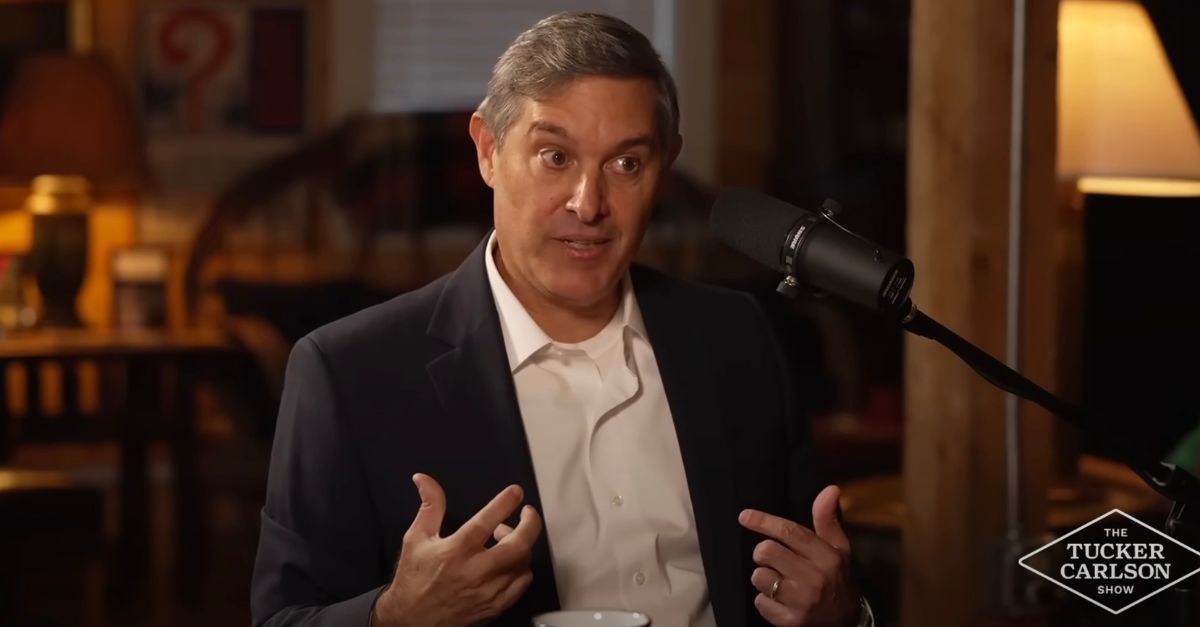
Stefan Passantino appearing on The Tucker Carlson Show in November 2024 (YouTube).
A federal judge in Georgia has rejected a lawsuit brought by a former White House ethics lawyer for Trump. The lawsuit accused members of the House Committee investigating the Jan. 6 Capitol attack of civil conspiracy and invasion of privacy.
The U.S. District Judge Eleanor L. Ross granted the government’s request to dismiss the case. The case was filed by Stefan Passantino. Passantino alleged that Committee members leaked confidential interview transcripts to CNN to damage his reputation and business.
Stefan Passantino worked as the deputy White House counsel in the first Trump administration. Afterward, he returned to the private sector during the Biden administration. He worked for Save America Leadership, a pro-Trump political action committee. Passantino represented individuals who testified before the Jan. 6 Committee.
Passantino was the first lawyer to represent Cassidy Hutchinson, the former special assistant to President Trump and Chief of Staff Mark Meadows, in her meetings with the Committee.
According to Passantino, then-Congresswoman Liz Cheney and Senior Investigative Counsel Dan George in May 2022 contacted Hutchinson without his knowledge and advised his client that he “would not be advancing her interests” because he “was being paid by a Trump-affiliated third-party,” which ultimately led to her seeking new counsel.
Hutchinson participated in several additional interviews and in December 2022, a CNN reporter contacted Passantino and said an unreleased transcript from one of Hutchinson’s interviews suggested he had counseled her “not to answer the Committee’s questions fully and honestly.”
Hutchinson testified that before her initial sessions with the Committee, Passantino would dangle potential jobs “in Trumpworld” and tell her she would be “taken care of.”
“I want to make this clear to you: Stefan never told me to lie,” she told the committee. “He specifically told me, ‘I don’t want you to perjure yourself, but ‘I don’t recall’ isn’t perjury. They don’t know what you can and can’t recall.””
CNN then published an article entitled “Trump’s former White House ethics lawyer told Cassidy Hutchinson to give misleading testimony to January 6 committee, sources say.”
Passantino claimed the interview transcripts contradicted CNN’s own story about him advising Hutchinson to be deceptive, but asserted the network went through with it anyway because it was given to them directly by the Committee.
He then filed a lawsuit under the Federal Tort Claims Act (FTCA), which allows injured plaintiffs to file tort lawsuits against the federal government in certain circumstances, typically when a government actor causes injury through negligence.
In dismissing his lawsuit, the court reasoned that Passantino’s claims of invasion of privacy and civil conspiracy arose out of alleged libel and slander, both of which are explicitly exempted from FTCA claims.
Essentially, because Passantino’s allegations are based on the Committee allegedly leaking false statements about him to the media, those allegedly false statements cannot form the basis of a valid claim under the FTCA’s Intentional Tort Exception (other exceptions include assault, battery, malicious prosecution, false arrest).
Ross summed up the reasoning as follows:
“At bottom, ‘all of the [Committee’s] allegedly tortious actions here are based on statements, representations, or imputations’ — actions that would form the basis of a claim barred by the libel/slander exception. And Passantino cannot point to any action by the Committee independent of these ‘statements, representations, or imputations’ upon which to base his claims. Passantino insists that this ‘suit is not based on the defamatory sting of the ensuing publication’ but rather ‘the publication of private information.’ But this assertion contradicts the whole of Passantino’s claims, which necessarily depend on the falsity of the information the Committee leaked to the media. Without that false information, Passantino cannot attribute any of the harm alleged in the Complaint to an act by the Committee.
Passantino calls his claims ‘invasion of privacy’ and ‘civil conspiracy,’ but in substance, he asserts a claim for defamation.
Ross further asserted that a subsequent report released by the House Committee on House Administration entitled “The Failures and Politization of the January 6th Select Committee” only “further undermined” Passantino’s claim by “showing that the private information about Passantino the Committee disclosed to the media and in a complaint to the D.C. Bar was, in fact, defamatory.”
“Passantino’s injury is ‘wholly attributable’ to the Committee’s defamatory statements — conduct expressly immunized by,” Ross wrote. “And no reading of the Complaint, even in a light most favorable to Passantino, supports Passantino’s argument that his claims are based upon ‘other independent government action.’”